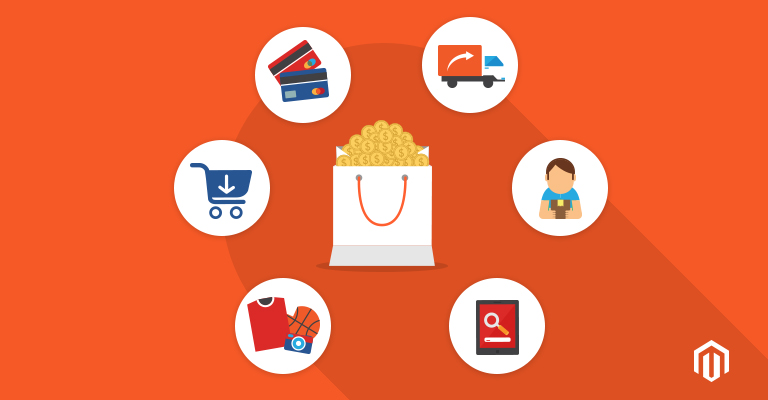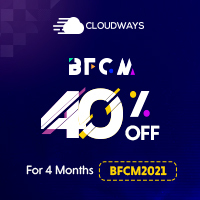How To Build, Launch And Grow A Profitable Ecommerce Business
- Magenticians
- November 16, 2016

Ecommerce is taking the new route, and for those who are yet to build their ecommerce store, the challenges are numerous. But despite so many challenges, it’s not necessary that things be hard for you in ecommerce business.
What we have here is a beginners guide to build, launch, and grow a profitable ecommerce business.
Here is a step by step guide that can help you perfect your entry into the ecommerce domain.
Name Your Idea/Business
Your business is your brainchild and giving it a name is the first thing you should do. What follows are 3 quick tips that can help you come up with an extraordinary brand name.
- Pronunciation – Consider a name that creates positive sound vibration.
- Connection with Audience – Choose a name that makes your audience feel a connection with your brand.
- Invent – Come up with something totally new and cool.
Turn Your Ecommerce Business Legitimate
Legal formalities are essential, and you cannot ignore them. Legal formalities differ from country to country, but if you are looking to start your venture in the US, here are a few of businesses you can get your company registered as:
- Sole proprietorship
- Limited Liability Company (LLC)
- Partnership (more than one owner)
- Cooperative (Customers are owners)
- Corporation (A separate legal entity)
- S Corporation
Get a Domain and Turn Your Brand Name Yours
Your domain and brand name should be the same so that there is no disconnect for the audience. Make sure you are purchasing a generic TDL if you are planning to go on a global scale. Bigrock, GoDaddy, name.com are some websites you can get your domain name from.
Hosting – On Cloud or Deployment Model
There’s no need to explain how important hosting is, so we’ll get straight into the things which should be a part of your hosting program.
- Cloud – Cloud Hosting is a convenient option for ecommerce store as it is easily scalable, can be configured based on particular requirements, and hardware devices can be shared, and so on.
- CDN – Localization of your website contents in several servers across the world is what CDN does. Thus requests are processed instantly by the CDN server close to the origin of the requested location resulting in faster experience.
Supplier Network
Whether it is regular shipment or drop shipment, you need to find the right procurement partner for your business. Your procurement terms should be planned properly to ensure that you never go out of supply.
Developing Your Ecommerce Store
You have two options on hand; Ecommerce website development from scratch or going for a readymade solution. Building everything from scratch takes time, but your website will be unique and will have everything that’s peculiar to your ecommerce business.
Additionally, you will not have to depend on a third-party script to roll out its updates to improve your ecommerce store.
Platform that Houses Your Dream
The first thing to consider is a platform for developing your ecommerce store. Magento is arguably one of the best platforms to build an ecommerce website on. With Magento rolling out version 2.0 of its community edition, there are no other better reasons for business owners to opt for Magento platform.
Essentials for Your Ecommerce Store
Product categorization:
Clear product categorization ensures that your visitors can locate what they are buying. It is always better to have a category tree with no more than three sub-levels.
Consumer reviews:
Give visitors a chance to review your products. It will help you know what’s wrong with your products, what customers expect, and what your competitors have that you don’t. Good reviews can convince an anonymous visitor to buy your products.
Easy checkout:
Simplify checkout options by integrating the necessary information into just one page. Autofill options can help in achieving this.
Generous Return Policies:
Return policies should be easy. In short, the return policy should be as simple as the shopping process. Your customers should not have to wait for long. It also adds to your brand’s experience.
Clear Navigation:
Breadcrumbs should be placed at the hierarchy levels so that visitors know which page they are in at any given point.
Social Login:
Simplify registration and login process by adding support via social networks, like Facebook, Twitter, etc. Your sign-ups are sure to skyrocket.
Other possible selling opportunities for your ecommerce store:
Mobile Apps and Social Media – You can create a dedicated mobile shopping app to extend your selling opportunity, and of course, this comes at a price. Another medium to sell is social media where you can almost replicate your ecommerce store.
Respect SEO rules:
SEO basics, especially the on-page essentials like web page URLs, meta titles, description, product images, keyword density, etc., must be in good shape to earn a better ranking.
Software Aid that Can Help You Manage Well
Well, the inventory, product information, and order processing systems come as a part of your ecommerce store backend options. Apart from these, you’ll be needing a lot more help to perform payment transactions, accounting, shipping, marketing activities. Third-party integrations like Xero, Shipstation, PayPal, MailChimp can be healthy choices.
Marketing Strategies
You have a variety of paid and free marketing methods which, when used in right proportions, can provide a significant push to your ROI and brand image.
Content marketing:
Content is king. It begins with product descriptions and sales up to blogs, write ups, guest blogging, PR releases and much more. Plan your content strategy according to your target audience. Your content should inform and educate your audience about your brand to help make their purchase decision easy.
Content forms are the base for SEO strategies which insist on building strong backlinks for improving organic traffic and search engine rankings.
Social media marketing:
Social media can help you in creating a healthy ROI and brand awareness. Mix up posts that speak about your brand and market your discounts and offers.
Affiliate marketing:
Turning your customers into brand advocates is the best thing to do to market your ecommerce store. However, this is just one among the many affiliate marketing methods. Unattached, Related, and Involved are the affiliate marketing methods you can easily earn from.
Search engine marketing:
Gaining prominence in search listings through paid campaigns can be great when done right. Search Ads, dynamic ads, and remarketing ads are the ad types commonly used by search engine marketers.
Conclusion
There you go, folks. Now that you have all the essentials of building, launching and marketing a profitable ecommerce business, we hope you’ll do great! If you have any queries, use the comment section below and we’ll get back soon!



